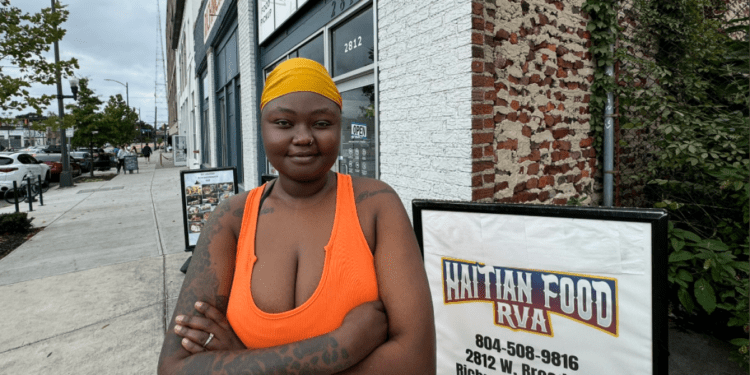We’ve all heard what former President Donald Trump and his running mate JD Vance have said about Haitian people and their food. But Sandrika Balthazar says it isn’t true.
“I love Haitian food. Period. It’s like, you’re eating the food, you’re thinking about it, you feel the love,” Balthazar told me in a break room at Richmond Eats, a local cloud kitchen that gives multiple chefs individual kitchen cubicles to cook and sell food through delivery services.
Balthazar came to the U.S. 16 years ago from her home in Gonaïves, Haiti. Her father was in politics. “Life in Haiti when you’re in politics is not the easiest place to be in,” she explained. “So, we decided to come to America for a safer place, a better place, a better situation.”
She spoke to me while flipping an order of beef fried rice. It’s got a Haitian kick, wafting delicious smells as she tosses the morsels of meat and veggies.
“You definitely gotta use Epis, you gotta use habanero, you definitely gotta use Maggi,” she said of the spices used in her cooking. “It’s a priority when cooking Haitian food.”
Following turmoil at home, the Balthazar family packed up their things and ended up moving to Delaware. Sandrika was only 14 when her family left Haiti, and admits they had a more lavish life back in her homeland with drivers and servants. But in America she got a job at a local chicken processing plant alongside other Haitians who also moved to the area.
“There’s a lot they say about Haiti, but there’s a beautiful side to it; we’re honest, hardworking people,” she said, noting some of her plant working colleagues would sleep at the facility so they could make enough money to support their families at home and abroad.
“I learned about life when I came to America. I learned things could be difficult and I had to use my brain,” she said. “But it made me who I am today. If I was in Haiti I wouldn’t have my own restaurant. I have that tough skin now.”
Arguably, she was using her brain before. She said she knows four languages, but she didn’t learn English until she moved to the states. It didn’t take long, though; her mother was pregnant with her sister when they first arrived, and she acted as a translator during the birth not long after.
Back in Delaware, Sandrika was inspired by watching her mother cook. Before long she started a Haitian food business out of her home, working before and after shifts at the chicken plant.
She met what would be her husband, Brandon Pajewski, and the two quickly bonded. Beyond the small food operation, she also started making hair oils that she’d sell locally. The two extracurriculars raised enough funds for her to be able to open her own spot.
But first she followed her mother to Richmond. With two kids, she relied on help from her mother while getting her new business off the ground.
“It takes a village to raise a family,” she says. As for Brandon and his Polish heritage, she notes Haiti had Polish people on the island back when it was founded. History books say Poles were brought by the French to help put down the Haitian revolution, but once there some refused to participate. And they were welcomed by the revolution’s leader Jean-Jacques Dessalines and given their own space in the new country when the war ended.
“He loved everybody, every color, every culture,” Balthazar said of Dessalines, a man she and her countrymen hold in deep regard. She even gave her daughter the middle name Dessalines in his honor.
And even furthering her commitment to her homeland, she opened Haitian food RVA May 18th of this year, just in time for Haitian Flag Day when her people celebrate the start of the Haitian Revolution. She proudly notes Haiti was the first nation to abolish slavery.
“What’s right is right, and we stand up for what we believe in,” she said. “We’re a strong people. If we believe in it, we’re going to make it happen.”
One might think this would cause her to have strong political views, especially in the wake of comments made by political leaders nationally. She said she’s gotten some flack, including folks asking about the former President’s comments. But Balthazar said she doesn’t let it bother her.
“I know there’s a lot of things being said about Haitian people right now, it’s happened with other cultures too,” she said. “It’s trying to divide us as a community, as a people.”
“You can’t force people to believe things that go against their beliefs,” she said, offering a level of understanding few may be able to relate to. “I’m a loving woman, a woman of God.”
As for the food, she jokes at first, she sought to soften the spice for American eaters, but after a while she learned better.
“I was taking down the spice of the culture, what the people loved the food for,” she said. “Maybe [it leads to] less customers, but you can’t satisfy everybody. So, I cook my food the way I was raised to be cooking it.”
And for those unsure about trying new foods, she has some advice there that may transcend the pallet and current political turmoil.
“I believe everyone should try it and make the decision themselves, to see if they like it or not,” she said. “Everyone deserves a chance.”
You can find out more about Haitian Food RVA online or in your local food delivery apps.
Source link : http://www.bing.com/news/apiclick.aspx?ref=FexRss&aid=&tid=66f13ff320d74f379ce27d56eacc16d7&url=https%3A%2F%2Fwww.wvtf.org%2Fnews%2F2024-09-23%2Fhaitian-food-rva-delivers-culture-eats-and-community&c=9047215208066060909&mkt=en-us
Author :
Publish date : 2024-09-22 22:57:00
Copyright for syndicated content belongs to the linked Source.







